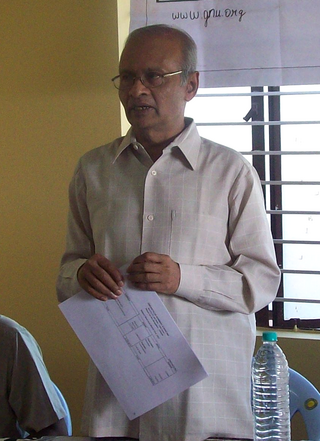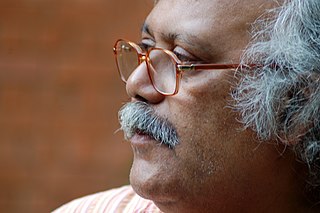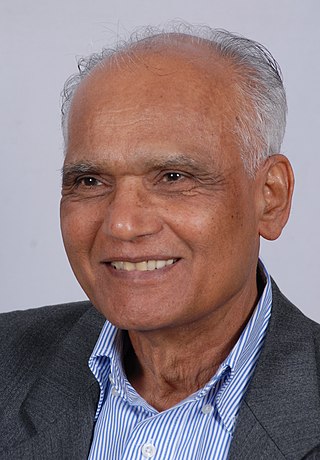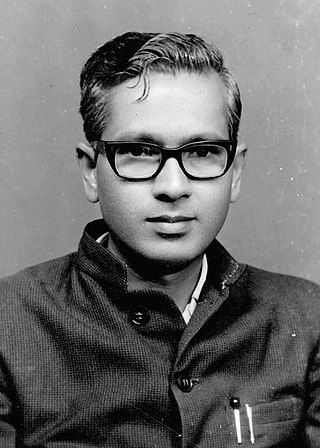Related Research Articles

Kuppali Venkatappa Puttappa, popularly known by his pen name Kuvempu, was an Indian poet, playwright, novelist and critic. He is widely regarded as the greatest Kannada poet of the 20th century. He was the first Kannada writer to receive the Jnanpith Award.

Udupi Rajagopalacharya Ananthamurthy was an Indian contemporary writer and critic in the Kannada language. He was born in Thirtahalli Taluk and is considered one of the pioneers of the Navya movement. In 1994, he became the sixth Kannada writer to be honored with the Jnanpith Award, the highest literary honour conferred in India. In 1998, he received the Padma Bhushan award from the Government of India. He was the vice-chancellor of Mahatma Gandhi University in Kerala during the late 1980s. He was one of the finalists of Man Booker International Prize for the year 2013. He remained a fervent critic of nationalistic political parties until his death from kidney failure and cardiac arrest on 22 August 2014.

Purohita Thirunarayana Narasimhachar, commonly known as PuTiNa, was a playwright and poet in the Kannada language. Along with, Kuvempu and D. R. Bendre, he forms the well-known trio of Kannada Navodaya poets. He was a Sahitya Akademi fellow and the winner of the Pampa Award, awarded by the Government of Karnataka in 1991.

Ambale Ramakrishna Krishnashastry (1890–1968) was an Indian writer, researcher and translator in the Kannada language. Krishnashastry has remained popular four decades after his death through his work Vachana Bharata, and his narration of the Hindu epic Mahabharata in the Kannada.

Theerthapura Nanjundaiah Srikantaiah commonly known as 'Thee. Nam. Shree., was a Kannada poet, essayist, editor, translator, linguist and teacher. He was awarded the Pampa Prashasthi for his work on the history and tradition of Indian poetics spanning two millennia titled Bharathiya Kavyamimamse. T. N. Srikantaiah was instrumental in preparing and publishing the Kannada version of Constitution of India in 1952. He is credited with the use of the vernacular equivalent of Rashtrapathi for the English 'President', a usage which is still in vogue. Srikantaiah was responsible for guiding the doctoral theses of Kannada litterateurs like S. Anantanarayan and M. Chidananda Murthy. An active participant in the Kannada Dictionary Project, Srikantaiah later laid the foundations for the Post Graduate Department at Manasa Gangotri campus at University of Mysore.

Chandrashekhara Kambara is a prominent Indian poet, playwright, folklorist, film director in Kannada language and the founder-vice-chancellor of Kannada University in Hampi also president of the Sahitya Akademi, country's premier literary institution, after Vinayak Krishna Gokak (1983) and U.R. Ananthamurthy (1993). He is known for effective adaptation of the North Karnataka dialect of the Kannada language in his plays, and poems, in a similar style as in the works of D.R. Bendre.

K. Chidananda Gowda is an Indian academic who served as the Vice-Chancellor of the Kuvempu University, which is located in the state of Karnataka, India. He is also the son-in-law of the Kannada Poet, Kuvempu, after whom the Kuvempu University is named. He has published many papers, mainly in the field of pattern recognition.

Hulkuntemath Shivamurthy Sastri Shivaprakash is a leading poet and playwright writing in Kannada. He is professor at the School of Arts and Aesthetics, Jawaharlal Nehru University, New Delhi. He heads the Cultural Centre at Berlin, known as the Tagore Centre, as Director run by Indian Council for Cultural Relations (ICCR). He has seven anthologies of poems, twelve plays, and several other books to his credit. His works have been widely translated into English, French, Italian, Spanish, German, Polish, Hindi, Malayalam, Marathi, Tamil and Telugu. His plays have been performed in Kannada, Hindi, Meitei, Rabha, Assamese, Bodo, Tamil and Malayalam. Shivaprakash is also a well-known authority on vachana literature, Bhakti movements of India, and Sufi and other mystic traditions.
Keshava Malagi is an Indian Kannada language writer of the post-Bandaya generation. He has published two novels, Kunkuma bhoomi and Angada dhare, and three short story collections, Kadala terege dande, Maagi moovattaidu and Vennela dorasani.

Malleshappa Madivalappa Kalburgi was an Indian scholar of Vachana sahitya in the Kannada-language and academic who served as the vice-chancellor of Kannada University in Hampi. A noted epigraphist of Kannada, he was awarded the National Sahitya Akademi Award in 2006 for Marga 4, a collection of his research articles.
Lingappa Basavaraju, commonly known as L. Basavaraju or LB, was an Indian scholar, writer, critic and researcher in Kannada. He was the author of over 56 works and his contribution to Kannada literature spread over 40 years.
Asaga was a 9th-century Digambara Jain poet who wrote in Sanskrit and Kannada language. He is most known for his extant work in Sanskrit, the Vardhamana Charitra. This epic poem which runs into eighteen cantos was written in 853 CE. It is the earliest available Sanskrit biography of the last tirthankara of Jainism, Mahavira. In all, he authored at least eight works in Sanskrit. In Kannada, none of his writings, including the Karnataka Kumarasambhava Kavya that have been referenced by latter day poets have survived.

Santeshivara Lingannaiah Bhyrappa is an Indian novelist, philosopher and screenwriter who writes in Kannada. His work is popular in the state of Karnataka and he is widely regarded as one of modern India's popular novelists. His novels are unique in terms of theme, structure, and characterization. He has been among the top-selling authors in the Kannada language and his books have been translated into Hindi and Marathi which have also been sellers.

Rahamat Tarikere is a Kannada writer, critic and teacher. He is well known for his sharp insights and his critical view on culture. He is one noted writers of the new generation of writers in Kannada. Currently he is a Professor in Kannada University at Hampi.

Togere Venkatasubbasastry Venkatachala Sastry, commonly known as T. V. Venkatachala Shastry, is a Kannada-language writer, grammarian, critic, editor and lexicographer. He has authored in excess of 100 books, translations and has edited collections of essays, biographical sketches and felicitation volumes. Recipient of the Kannada Sahitya Akademi Award (honorary), Sastry is an authority on Kannada language grammar and its various facets ranging from the metre scale on which he has written extensively to the history of Kannada literature spanning two millennia.

Shantinath Desai was one of the leading modern authors of the Navya (modernist) movement in Kannada Literature.

Kampalapura Veeranna Narayana, also known as KVN, is an Indian linguist, professor of Kannada language and literature, and a literary critic. He is currently the Chairman of the Kuvempu Bhasha Bharathi Pradikara, Government of Karnataka. He hails from Piriyapattana in Mysore district. During his time as a professor in Bangalore University, he initiated investigations into Kannada language and culture from the root level. He served as the registrar of Hampi Kannada University. His major areas of interest are Kannada language, literature, teaching and science.

Haleyuru Srinivasa Krishnaswamy Iyengar was a Kannada columnist, essayist, novelist, critic and teacher of Economics and Commerce studies in Mysore. He is remembered for his character sketches and short essays on personalities and issues of national & international import, in his weekly column "Varada Vyakthi". These appeared in the Kannada magazine "Sudha" continuously for nearly two decades. His literary critique "Kannadadalli Vidambana Sahitya" won him the Kannada Sahitya Akademi Award in 1981. His perspective on elements of Vishistadvaita in the works of Kuvempu were brought forth in his book "Kuvempu Sahityadalli Vishistadvaita – Darshana". H. S. K. penned close to thousand character sketches over two decades. These were later published in four collected volumes. He received the "Rajyotsava Award" from Government of Karnataka in 1997. For his lifetime contribution to Journalism and Kannada literature, the University of Mysore conferred a doctorate degree on him in 2004.

Chidananda Parasappa Siddhashrama, known as CPS or Prof. Siddhashrama is an Indian academic, writer, critic and poet, known for his works in Kannada. He is a retired professor of Mysore University where he served as the acting Vice Chancellor. In 2020, for his contributions to the field of literature, Siddhashrama has been awarded the Karnataka Rajyotsava Award by Government of Karnataka.

Taľaku Subbanna Venkannayya was University of Mysore's first Kannada Professor. He was also a popular Kannada writer, translator, editor and teacher who nurtured many later Kannada littérateurs like Kuvempu, D. L. Narasimhachar, T. N. Srikantaiah, K. S. Narasimhaswamy, M. V. Seetharamaiah, C. K. Venkataramaiah, K. Venkataramappa, G. Venkatasubbiah and S. V. Parameshwara Bhatta. In fact, Kuvempu begins his book Sri Ramayana Darshanam with a two-page dedication to his teacher T. S. Venkannayya. T. S. Venkannayya translated the biography of Ramakrishna Paramahamsa from Bengali into Kannada for the first time in 1919. T. S. Venkannayya along with D. V. Gundappa, V. Seetharamaiah, B. M. Srikantaiah and T. N. Srikantaiah were at the forefront of the Kannada Movement from 1920s onwards and were instrumental in the founding of Kannada Sahitya Parishat (Bangalore) and Kannada Sangha at Central College, Bangalore and Maharaja College, Mysore. T. S. Venkannayya was responsible for the organising of the 1931 Kannada Sahitya Sammelan at Mysore.
References
- ↑ "Earlier Vice-chancellors of the university". Gulbarga University. Archived from the original on 28 September 2006. Retrieved 25 March 2007.
- ↑ "Kannada writer Nayak dead". The Tribune India. Retrieved 25 March 2007.
- ↑ "Sahitya Akademi Awards". Sahitya Akademi. Archived from the original on 11 December 2007. Retrieved 25 March 2007.